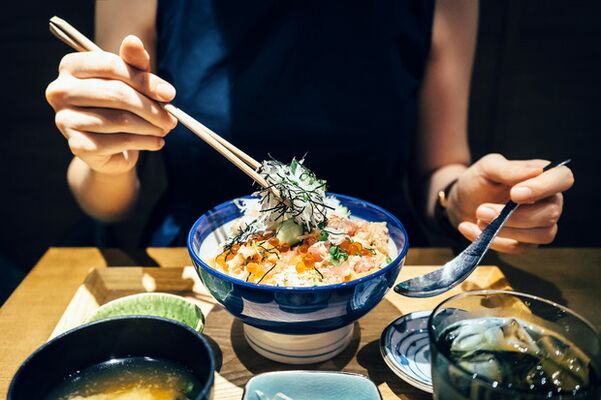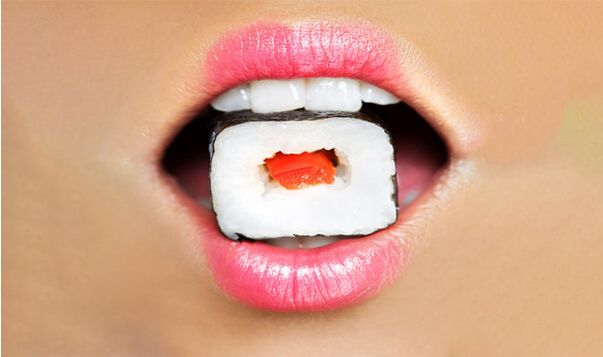Japanese are known for their harmonious physique and long life expectancy, which in many ways is due to the diet they follow.Editors turned to candidates for medical science, PhD in Medical Sciences, and are experts from the federal fitness club network Diettitt, to understand all the characteristics of diet.
The essence of Japanese diet is the emission of metabolism.You need to clearly observe the cooking rules without changing the order of days or set of products.This diet can be called Bessolev, because you drink a lot of alcohol and don't eat salty foods, so it's actually washed out.

The diet is based on a diet that increases protein in the diet and limits fat and carbohydrates.The basis of the menu should be low in fatty fish, chicken, beef, eggs, cheese and kefir.Medium fruits are not prohibited from vegetables.Like any diet, the list you have to reject is wider.
Forget about salt, sugar, seasonings (they make you eat more than you need to satisfy your hunger), leave smoked meat, bread, bananas and grapes in the store.
The Japanese woman is affectionately called diet and threatens dehydration, so it is especially important to drink at least 2 liters of water a day during these 14 days.
You should not stay hungry at the expense of protein - it is saturated, and the cheese allowed will provide the necessary minimum fat for the body and vegetables - fiber and carbohydrates.
The Japanese diet menu was designed for a week and then planned to repeat the days that had passed.Snacks and any deviations from the proposed menu are strictly prohibited during diet, otherwise the results will be far from expected.
They promised
Duration of Japanese diet:From 7 days to 14 days.no longer!
How much can you throw away:Up to 8 kg.
Features:Available.
Disadvantages of Japanese Diet:A very strict diet that is hard to bear rather than rupture.
Some experts believe that the Japanese diet can improve metabolism for up to two years, that is, after two weeks of torture, the result will be long-term.
Characteristics of nutrition of Japanese residents
Japan is a long country.The average life expectancy for women is 87 years, which is more than any other country in the world.What's the reason for such an incredible life expectancy?The researchers believe that the reason is the general lifestyle, especially the nutritional culture.

First, Japanese food is cooked, stewed and steamed, but not fried with a lot of oil.Fundamentally, this distinguishes Japanese cuisine from Western and even Chinese cuisine, where all dishes are very fat.
Secondly, in the Japanese diet, there are many fresh seasonal products used in combination with products of various colors.Therefore, the principle of diversity forms the basis for healthy nutrition in Japan.
Third, the Japanese are very small in size, and in this regard, they are fundamentally different from the residents of other countries.Japanese desserts are much smaller than traditional Western, and most areas are used to residents of some countries (for example, 400g pork kebabs) that are completely unacceptable to the Japanese.
Japanese diet underwater stones
"The problem is that the Japanese diet has nothing to do with the Japanese nutrition type," one expert-Ditititian's attitude to the legend, which was developed in some Japanese clinics.However, there is no description of the clinic or its address on any English language or Russian-speaking website.Meanwhile, by typing the phrase for the clinic name into any search engine, you can find over a thousand monotonous texts and describe Japanese diets.However, relying on my medical experience, I can confidently say that the Japanese diet does not exist.I will provide reasons for my position.
- The Japanese diet is a low-calorie diet designed for 7-14 days.During this time, you can indeed throw a few kilograms as any strict dietary restrictions will lead to weight loss.However, adipose tissue is not only an extra substance, but also the most important endocrine organ.The sharp release of several kilograms is full of imbalances in metabolic regulation.
- This is a low-carb diet.However, carbohydrates, as well as proteins and fats, are important components of nutrition.In addition, carbohydrates are the energy we use every day for mental and physical work.Another energy source that does not contain fat form in the Japanese diet.
- This is a diet that does not offer breakfast essentially because it is hard to call a black coffee or vegetable breakfast.However, breakfast is the main meal, thanks to all the necessary components of our nutrition (protein, fat and carbohydrates) in order to provide enough functionality in the first half of the year.
- Finally it's diet.Any diet based on restrictions will not take into account food behavior and the rules of healthy eating.This then leads to the fact that the classic mechanism “diet weight loss – getting better after diet”.
So it is no different from other diets that have no reason to be worthy of: they are united by slogans that guarantee a quick loss of 10 kg per week, without taking into account the consequences of a sharp weight loss in human health.
Regardless, diet preparation should be thorough, and it is best to consult your doctor before going to Japanese food.If you don't have contraindications, you can try this diet: pregnant women, breastfeeding mothers, with liver disease, kidneys, gastritis and ulcers, should not turn to this hard diet.

Japanese diet during the day
Day 1
breakfast:Black coffee (always without sugar and milk).
dinner: 2 hard eggs, cooked cabbage salad (seasoned with vegetable oil) and a cup of tomato sauce.
dinner:250g boil or fried fish.
the next day
- breakfast:Black coffee and a piece of rye bread.
- dinner:250g cooked or fried fish, cooked cabbage salad.
- dinner:100g boiled beef and a cup of kefir.
Day 3
- breakfast:Black coffee and a piece of rye bread.
- dinner:Big zucchini are fried in vegetable oil.
- dinner:2 hard boiled eggs, 200g unsalted beef, lettuce salad.
Day 4
- breakfast:Black coffee.
- dinner:1 egg, 3 carrots and 15 grams of cheese.
- dinner:200 grams of fruit.
Day 5
- breakfast: Crilled carrots with lemon juice.
- dinner:200g cooked or fried fish and a glass of tomato sauce.
- dinner:200 grams of any fruit.
Day 6
- breakfast:Black coffee.
- dinner:400g uncooked chicken, a fresh cabbage and carrot salad.
- dinner:2 eggs were screwed and fresh carrots.
Day 7
- breakfast:Tea.
- dinner:200g unsalted beef, 200g fruit.
- Any previous dinner.
There are many contraindications in this diet, ranging from stomach problems to puberty or pregnancy, so it is a consultation from a doctor before use.
Day 8
- breakfast:Black coffee.
- dinner:500g boiled chicken and a side dish of carrots and cabbage.
- dinner:Fresh carrots and 2 boiled eggs.
Day 9
- breakfast: Crilled carrots with lemon juice.
- dinner:200g cooked or fried fish and a glass of tomato sauce.
- dinner: 200g fruit (you can make salads).
Day 10
- breakfast:Black coffee.
- dinner: 3 boiled carrots, 1 boiled egg and 50g cheese.
- dinner:200 grams of fruit.
thirteenth
- breakfast:Black coffee and a piece of rye bread.
- dinner:Big zucchini are fried in vegetable oil.
- dinner:200g cooked unsalted beef, 2 boiled eggs and fresh cabbage salad.
Day 12
- breakfast:Black coffee and a piece of rye bread.
- dinner:200g cooked or fried fish and fresh cabbage salad.
- dinner:100 grams of boiled beef and a cup of kefir.
Day 3
- breakfast:Black coffee.
- dinner: 2 boiled eggs, cooked cabbage and a glass of tomato sauce.
- dinner: 200g boil or fried fish.
Day 14
- breakfast:Black coffee.
- dinner:200g boiled or fried fish, fresh cabbage salad.
- dinner:200 grams of boiled beef, one cup of kefir.
































